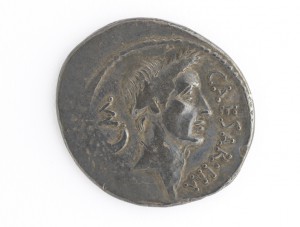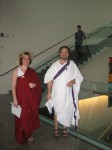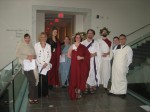
“Beware the Ides of March,” so says the soothsayer in Shakespeare’s Julius Caesar. Little did visitors to the VMFA this morning realize that it was they who needed to beware. Innocently coming to the museum, perhaps for a bit of Ife, perhaps for a bit of Picasso, perhaps just to enjoy our permanent galleries (for example, the Greek, Roman, and Etruscan gallery; Egyptian art coming soon!), staff members (and their more exhibitionist friends) regaled our visitors with a reading of Caesar’s death scene and Marc Antony’s funeral oration.
The bridge in the Atrium proved a perfect venue for performance, and Jessica slew them with the dying throes of Caesar. Oddly, a surprising number of staff members volunteered to take part in this scene once they learned who would play Caesar. She always seemed such a nice girl, too.
If Caesar’s enemies feared that in life he aspired to be king, they never thought that in death he would become a god. At the celebration of Caesar’s victories soon after his death, a comet appeared in the skies over Rome and Romans said it was Caesar joining the gods. From then on, Caesar became Divus Julius (the divine Julius), and declaring himself Filius Divi (“son of the divine”), Caesar’s nephew and adopted son brought down the fragile Roman republic and established the principate, the imperial system based in Rome that endured for centuries.
-Dr. Peter Schertz, Jack and Mary Ann Frable Curator of Ancient Art




